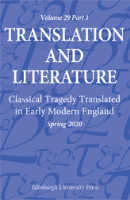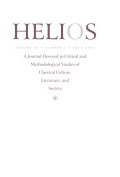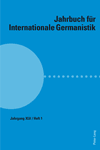
LEA-Lingue e Letterature d Oriente e d Occidente
Scope & Guideline
Cultivating Critical Discourse Across Linguistic Boundaries
Introduction
Aims and Scopes
- Translation Studies:
A core focus on the methodologies and implications of translation, particularly in relation to how literary works from different cultures are interpreted and transformed across linguistic boundaries. - Cultural Exchange and Influence:
Exploration of the ways in which Eastern and Western literatures influence each other, including thematic adaptations and cultural dialogues that arise from these interactions. - Gender Studies and Literary Criticism:
An emphasis on gender dynamics within literature, examining how gender roles and representations evolve across different historical and cultural contexts. - Historical Contextualization of Literature:
Analysis of literary works within their historical frameworks, including discussions on how historical events shape narrative forms and themes in literature. - Interdisciplinary Approaches:
Utilization of various methodologies from fields such as linguistics, cultural studies, and philosophy to enrich the analysis of literary texts and their translations.
Trending and Emerging
- Decadent Aesthetics:
An increasing focus on decadent aesthetics, particularly in relation to modern translations and interpretations of classic works, highlights a renewed interest in this literary movement and its implications. - Interdisciplinary Gender Studies:
A surge in discussions surrounding gender dynamics, particularly in contemporary literature, showcases an evolving understanding of gender roles and identities in various cultural contexts. - Cultural and Linguistic Contamination:
Emerging themes of linguistic and cultural contamination reflect the complexities of globalization and migration, emphasizing how cultures influence and reshape each other through literature. - Responses to Contemporary Issues:
Themes addressing modern challenges such as pandemics, isolation, and biopolitics signal a growing interest in how literature reflects and responds to contemporary societal issues. - Exile and Identity:
A notable trend in exploring themes of exile and identity suggests an engagement with the experiences of displacement and the nuances of belonging in a globalized world.
Declining or Waning
- Traditional Literary Forms:
There is a noticeable decrease in studies focusing solely on traditional literary forms and canonical texts, as contemporary approaches favor more dynamic, interdisciplinary studies. - National Literature Studies:
Research centered on national literatures as isolated entities is less common, with a shift towards transnational and comparative studies that highlight global literary landscapes. - Purely Linguistic Analyses:
While language remains an important aspect, analyses that focus solely on linguistic structures without considering cultural or literary contexts are becoming less frequent.
Similar Journals

Imagologiya i Komparativistika-Imagology and Comparative Studies
Bridging Cultures: The Art of Comparative StudiesImagologiya i Komparativistika-Imagology and Comparative Studies is a distinguished academic journal published by TOMSK STATE UNIVERSITY in the Russian Federation, focusing on the dynamic interplay between various cultural narratives and comparative methodologies. Since its inception, the journal has become a vital platform for the dissemination of research in fields such as communication, cultural studies, literature and literary theory, and the visual and performing arts. With an evolving scope from 2018 to 2024, it aims to foster interdisciplinary dialogue and promote scholarly examination of cultural phenomena from multiple perspectives. Despite its Q4 status in Communication and rankings that suggest emerging influence within its field, it occupies crucial quartiles in Cultural Studies, Literary Theory, and the Arts, encouraging researchers and students to contribute to its growth. Although currently not an open access journal, its significance lies in its commitment to enriching the understanding of imagology and comparative studies. The journal serves as both a scholarly resource and a catalyst for innovative ideas, making it essential for anyone invested in the arts and humanities.

Translation and Literature
Unraveling the Threads of Language and LiteratureTranslation and Literature is a leading academic journal published by Edinburgh University Press, focusing on the intricate relationship between language and literature within the realms of translation studies. With an ISSN of 0968-1361 and an E-ISSN of 1750-0214, this journal provides a crucial platform for scholars and practitioners to explore and disseminate research that addresses both the theoretical and practical aspects of translation. Since its inception in 1996, Translation and Literature has established itself as an essential resource, particularly noted for its contributions to the fields of linguistics and literary theory, as indicated by its Q4 ranking in both categories in 2023. The journal's articles are designed to foster dialogue across disciplines, encouraging innovative thinking and collaboration among researchers, professionals, and students alike. Access to this valuable resource is currently available through subscription, ensuring high-quality scholarship reaches a diverse audience dedicated to advancing the understanding of translation's role in literature.

RLC-REVUE DE LITTERATURE COMPAREE
Advancing Comparative Insights Across CulturesRLC-REVUE DE LITTERATURE COMPAREE, published by DIDIER-ERUDITION, is a prominent French journal focused on comparative literature and literary theory, holding an ISSN of 0035-1466. Established in 2001, the journal aims to foster scholarly exchange and critical analysis in the field of literature, examining texts across cultures and disciplines. With its current categorization in the Q4 quartile for literature and literary theory as of 2023 and holding a Scopus rank of #880 out of 1106, RLC remains an accessible resource for researchers, professionals, and students alike. While it operates under a traditional access model, it continuously strives to contribute to the academic discourse within its scope, enhancing the understanding of literary complexities and intercultural exchanges. Based in the heart of Paris, at 6 RUE DE LA SORBONNE, the journal invites contributions that explore innovative perspectives and methodologies in literary studies through its ongoing commitment to scholarly excellence.

GERMANISCH-ROMANISCHE MONATSSCHRIFT
Fostering Innovative Perspectives in Linguistic StudiesGERMANISCH-ROMANISCHE MONATSSCHRIFT, published by UNIVERSITATSVERLAG C WINTER HEIDELBERG GMBH, is a vital academic journal dedicated to the fields of linguistics, literature, and literary theory. With its ISSN 0016-8904, this journal fosters scholarly discussions and disseminates innovative research that intersects Germanic and Romance languages and literatures. While it does not currently offer Open Access options, its contributions have positioned it within the Q4 quartile in both Linguistics and Language, and Literature and Literary Theory according to the 2023 category rankings. The journal's Scopus ranking reflects its emerging place within the academic community, situated at the 40th percentile for Literature and Literary Theory, and the 20th and 18th percentiles within Language and Linguistics, respectively. Scholars and students are encouraged to engage with this resource as it offers a platform for new perspectives that are pivotal to understanding the complex interrelations of these linguistic traditions, enriching both teaching and research initiatives.

HELIOS
Pioneering Research in Cultural Studies and Linguistics.HELIOS is a distinguished academic journal published by TEXAS TECH UNIVERSITY PRESS, focusing on the fields of Classics, Cultural Studies, Linguistics and Language, and Literature and Literary Theory. Since its inception in 1984, the journal has served as a platform for scholarly discourse, publishing innovative research that intersects various humanistic disciplines. With a Q3 ranking in Classics and Literature and Literary Theory, as well as a Q4 ranking in Cultural Studies and Linguistics and Language, HELIOS demonstrates its commitment to advancing academic inquiry and knowledge dissemination. Although it is not an open-access publication, HELIOS remains a vital resource for researchers, professionals, and students seeking to explore and contribute to the evolving landscape of the humanities. The journal is based in the United States, with its administrative office located at 2903 Fourth Street, Suite 201, Box 41037, Lubbock, TX 79409-1037, making it an integral part of the scholarly community.

Monteagudo
Cultivating a Platform for Artistic and Linguistic InnovationMonteagudo, published by UNIV MURCIA, is an important academic journal dedicated to the fields of Arts and Humanities, particularly focusing on Literature, Literary Theory, Visual Arts, and Linguistics. Since its inception in 2019, it has aimed to provide a scholarly platform for innovative research and critical discourse within these disciplines. With an ISSN of 0580-6712 and an E-ISSN of 1989-6166, the journal seeks to enhance the visibility of emerging ideas and methodologies, while fostering an inclusive academic dialogue. Although Monteagudo does not currently offer Open Access options, its significance is reflected in its Scopus rankings, which position it within the 14th to 32nd percentile across various categories. With its operations based in the heart of Murcia, Spain, the journal is poised to influence both regional and international scholarly conversations, making it an essential resource for researchers, professionals, and students aiming to expand their understanding of contemporary issues in Arts and Humanities.

Revue Italienne d'Etudes Francaises
Navigating the Intersection of Language, History, and TheoryRevue Italienne d'Etudes Francaises, published by SEMINARIO FILOLOGIA FRANCESE, is a pivotal open access journal dedicated to the exploration and analysis of French studies within the broader context of history, linguistics, and literary theory. Since its inception in 2011, this journal has fostered scholarly dialogue and critical discourse, offering a platform for researchers, professionals, and students alike to disseminate their work and engage with contemporary issues in these fields. With an ISSN and E-ISSN of 2240-7456, the journal has established itself within the academic community, although it currently ranks in the lower quartiles across various disciplines, as indicated by its Scopus metrics. Nevertheless, the Revue Italienne d'Etudes Francaises remains an essential resource for those seeking to deepen their understanding of Francophone literature, culture, and linguistic dynamics from its base in Rome, Italy, at C/O Fondazione Primoli. As the field of French studies continues to evolve, this journal plays an important role in highlighting the latest research findings and theoretical advancements.

JAHRBUCH FUR INTERNATIONALE GERMANISTIK
Fostering Critical Discourse in German Language and CultureJAHRBUCH FUR INTERNATIONALE GERMANISTIK is a prominent academic journal published by VERLAG PETER LANG AG, dedicated to advancing research in the fields of German studies, literature, and linguistics. With its ISSN 0449-5233 and E-ISSN 2235-1280, this journal provides a platform for scholarly discourse, critical analysis, and innovative studies related to German language and literary theory. Although its coverage in Scopus was discontinued in 2014, the journal continues to be influential within the academic community, evidenced by its rankings in the Arts and Humanities and Social Sciences categories. Specifically, it holds a rank of #397 in Literature and Literary Theory and #477 in Language and Linguistics, reflecting a solid presence among peers. Researchers and students alike can benefit from its insightful articles that delve into various dimensions of Germanistik, thereby fostering a greater understanding of language and cultural contexts. For those interested in contributing to this field of study, JAHRBUCH FUR INTERNATIONALE GERMANISTIK serves as an essential resource for high-quality scholarly content.

Dicenda-Cuadernos de Filologia Hispanica
Exploring the Depths of Hispanic Linguistics and LiteratureDicenda-Cuadernos de Filologia Hispanica, published by UNIV COMPLUTENSE MADRID, SERVICIO PUBLICACIONES, is a distinguished academic journal in the fields of linguistics, literature, and literary theory. Since its transition to Open Access in 2017, it has facilitated unrestricted dissemination of knowledge, making it an invaluable resource for researchers, scholars, and students interested in the rich tapestry of Hispanic philology. With an impact factor reflected by its Scopus rankings—at Q3 in Linguistics and Language and Q2 in Literature and Literary Theory—Dicenda serves as a vital platform for innovative research and critical discourse. The journal actively encourages submissions that explore contemporary and historical perspectives within its scope. Located in Madrid, Spain, the journal has steadily established itself as a significant contributor to the ongoing dialogue in the humanities, fostering a deeper understanding of linguistic and literary phenomena.

Folia Linguistica et Litteraria
Innovating Research in Language and Literary StudiesFolia Linguistica et Litteraria, published by the University of Montenegro's Institute of Language and Literature, is an esteemed academic journal that provides a vital platform for the exploration and discourse in the fields of Linguistics and Literary Theory. With an ISSN of 1800-8542, this journal serves as a significant resource for researchers, educators, and students alike, fostering an understanding of language, literature, and their interrelationship. Having established its presence in the scholarly community, Folia Linguistica et Litteraria has been ranked in the 2023 quartiles, achieving Q3 in Linguistics and Language, and Q2 in Literature and Literary Theory, indicating its growing influence and relevance. Its Scopus rankings further underscore the journal’s commitment to high-quality research, reflecting its standing within the arts and social sciences. While the journal operates without open access, its rigorous peer-review process ensures that only the most impactful studies are published. As it converges its focus from 2019 to 2024, this journal invites contributions that challenge conventional boundaries, encouraging interdisciplinary dialogue and innovative research in the rich fields of linguistics and literary studies.